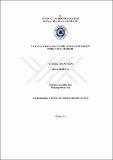DSpace Repository
3-6 YAŞ ÇOCUKLARDA MÜZİK VE DANS EĞİTİMİNİN PSİKOLOJİK ETKİLERİ
JavaScript is disabled for your browser. Some features of this site may not work without it.
| dc.contributor.author | Sezince, Merve
|
|
| dc.date.accessioned | 2019-05-28T14:05:19Z | |
| dc.date.available | 2019-05-28T14:05:19Z | |
| dc.date.issued | 2018 | |
| dc.identifier.uri | http://hdl.handle.net/11547/2293 | |
| dc.description.abstract | Dans ve müzik eski zamanlardan beri insanları etkilemiş; şifa, terapi, hipnoz olarak kullanılmış ve bir çok hastalığa dans ve müzik çeşitleriyle tedavi aranmıştır. Bu çalışmada 3-6 yaş çocuklarda dans eğitiminin motivasyon, fiziksel ve psikolojik etkilerinin araştırılması hedeflenmiş, bu doğrultuda çocukların motivasyon, fiziksel ve psikolojik gelişiminin ölçülmesi amaçlanmıştır. Günümüzde milli eğitim programında okul öncesi dönemde ve ilkokul döneminde müzik ve dans dersleri zorunlu görülmemektedir. Ancak 3-6 yaş çocukların psikolojik gelişimlerini tamamlarken müzik ve dans derslerinin onların gelişimlerini desteklediği görülmektedir. Bir çok özel anaokulda 3-6 yaş çocukların temel müzik derslerini aldıkları; bedenlerini tanımak, vücut dilini kullanma becerilerini kavramak ve duygularını yansıtabilmek için de dans derslerini branş dersi olarak aldıkları görülmektedir. Bu konunun seçilme nedeni ise, okul öncesi dönemden itibaren dans dersleriyle çocukların gelişimine destek olunmasının onların motivasyon, fiziksel ve psikolojik gelişimlerine önemli katkılarda bulunacağı fikridir. Araştırmaya 40 erkek, 47 kız olmak üzere 87 öğrenci katılmıştır. 27 sorudan oluşan kontrol listesi hazırlanarak, ilk 4 maddesi sadece Birinci Dönem sonunda, diğer 23 maddesi ise hem Birinci Dönem sonunda (ilk dersten dört ay sonra) hem de İkinci Dönem sonunda (ilk dersten yedi ay sonra) olmak üzere iki kez uygulanmıştır. Soruların dördünün yanıtları veli gözlemi yardımıyla, diğerleri ise araştırmacının gözlemiyle toplanmıştır. Araştırmada elde edilen bulgulara göre; 3-6 yaş arası çocuklarda dans terapi yöntemlerinin yaş gruplarına göre uyarlanarak işlendiği dans dersleri, çocukların toplam motivasyon, fiziksel ve psikolojik gelişimlerini arttırmaktadır. Çocukların toplam motivasyon, fiziksel ve psikolojik gelişimleri, cinsiyete göre farklılık göstermemekte (p>0,05) ancak erkek çocuklar kız çocuklara göre ders öncesi girişte sohbete anlamlı düzeyde daha fazla katılmaktadırlar (p<0,05). Çocukların toplam motivasyon, fiziksel ve psikolojik gelişimleri, yaş gruplarına göre ise farklılık göstermektedir (p<0,05). | tr_TR |
| dc.language.iso | tr | tr_TR |
| dc.publisher | İSTANBUL AYDIN ÜNİVERSİTESİ SOSYAL BİLİMLER ENSTİTÜSÜ | tr_TR |
| dc.subject | Okul Öncesi Eğitim | tr_TR |
| dc.subject | Dans | tr_TR |
| dc.subject | Müzik | tr_TR |
| dc.subject | Psikolojik Etkiler | tr_TR |
| dc.subject | Pre-School Education | tr_TR |
| dc.subject | Dance | tr_TR |
| dc.subject | Music | tr_TR |
| dc.subject | Psychological Impacts | tr_TR |
| dc.title | 3-6 YAŞ ÇOCUKLARDA MÜZİK VE DANS EĞİTİMİNİN PSİKOLOJİK ETKİLERİ | tr_TR |
| dc.type | Thesis | tr_TR |
| dc.description.abstractol | Dance and music has been used as healing, therapy and hypnosis since ancient times, and many kinds of dance and music have been sought for treatment. In this study, it is aimed to investigate the motivation, physical and psychological effects of dance education in 3-6 years children; thus to measure the motivation, physical and psychological development of children in this direction. Today, music and dance lessons are not necessarily required in the pre-school and primary school periods in the national education program. However, it’s been seen that music and dance lessons supplement their development while completing the psychological development of 3-6 years children. In many private kindergartens, there have been basic music lessons in 3-6 years children and they are able to recognize their bodies, recognize their body language skills, and take dance lessons as a branch lesson to reflect their feelings. The reason for choosing this subject is due to the idea that supporting the development of children by dance and music lessons from pre-school period would give significant contributions to their academic achievement and psychological development. 87 students (40 male and 47 female) participated in the research. A checklist consisting of 27 questions was prepared and the first 4 items were applied only at the end of the First Term and the other 23 items were applied twice at the end of the First Semester (four months after the first lesson) and at the end of the Second Semester (seven months after the first lesson). The answers of four of the questions were collected with the help of parental observation and the others with the observation of the researcher. According to the findings obtained in this research; it’s found that the dance lessons, in which dance therapy methods are adapted according to age groups, increase the total motivation, physical and psychological development of children in 3-6 years old children. The overall motivation, physical and psychological development of the children do not differ according to the gender (p>0,05) but the boys participate more significantly in the conversation in pre-class entry than the girls (p<0,05). The overall motivation, physical and psychological development of children differ according to age groups (p<0,05). | tr_TR |
| dc.publisher.firstpagenumber | 1 | tr_TR |
| dc.publisher.lastpagenumber | 67 | tr_TR |
Files in this item
This item appears in the following Collection(s)
-
Tezler -- Thesis [3470]
